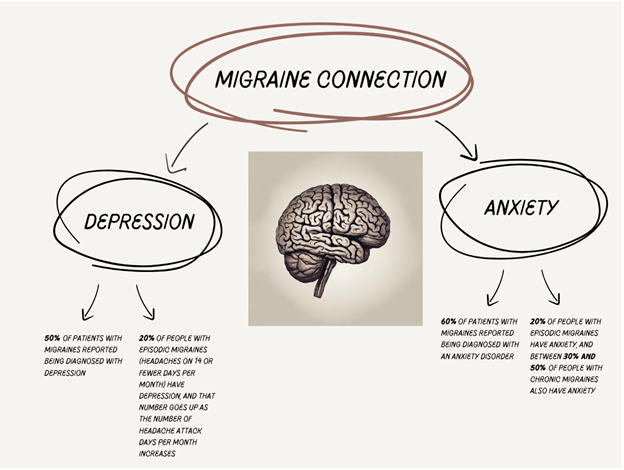My first migraine began during my junior year of college. Soon thereafter, I began being plagued by depression and anxiety. I have always experienced a level of anxiety throughout my whole life, but this was different. This was absolutely debilitating. As time went on and I began to learn how my body reacts to these three troublemakers, I noticed they seemed to be linked together. This caused me to wonder if it was just me, or if medical research has found a link between them. Do migraines increase the risk of depression and anxiety? I will share what I discovered and offer insight to managing the physical and emotional aspects of these conditions.
According to the American Migraine Foundation, people with migraines are about five times more likely to develop depression than someone without migraines. The same source also states that about 20 percent of people with episodic migraines (headaches on 14 or fewer days per month) may also have depression, and that number goes up as the number of headache attack days per month increases. Similarly, about 20 percent of people with episodic migraines have anxiety, and between 30 percent and 50 percent of people with chronic migraines also have anxiety. In the 2022 Migraine and Mental Health Connection Survey, almost 60 percent of patients with migraines reported being diagnosed with an anxiety disorder, 50 percent reported depression.

While the exact mechanisms are not fully understood, several factors contribute to this connection:
- Overlaps: Migraines and mood disorders share some common neurological pathways and neurotransmitters, such as serotonin. Changes in serotonin levels are associated with both migraines and mood disorders, making individuals susceptible to both conditions.
- Chronic Pain: The persistent, excruciating pain of migraines can lead to chronic stress, which in turn, can trigger or exacerbate depression and anxiety. Coping with pain daily can be emotionally draining.
- Lifestyle Impact: Migraines often disrupt sleep patterns, trigger dietary restrictions, and limit physical activities. These lifestyle changes can contribute to the development of depression and anxiety.
- Social Isolation: Migraines can lead to social withdrawal as individuals fear experiencing an attack in public or during social events. This isolation can worsen feelings of depression and anxiety.
Managing the Migraine-Mood Disorder Connection:
- Seek Professional Help: Consult with healthcare professionals who can help create a tailored treatment plan, which may include medication, therapy, or lifestyle modifications.
- Keep a Migraine Diary: Tracking migraine triggers, symptoms, and mood fluctuations can provide valuable insights. Identifying patterns can help you and your healthcare team develop a more effective management plan. There are a lot of apps that can help you track your migraines.
- Manage Stress: Learning stress-reduction techniques like mindfulness, relaxation exercises, and meditation can be immensely beneficial in alleviating both migraines and mood disorders.
- Healthy Lifestyle Choices: Prioritize a well-balanced diet, regular exercise, and sufficient sleep. These lifestyle factors can positively influence both your physical and mental health.
- Support Networks: Engage with support groups, friends, and family members who can provide emotional support and understanding during difficult times.
Through keeping a migraine and mood diary/journal, I discovered that maintaining good sleep hygiene and getting the best sleep I can is what helps me the most. While the link between migraines, depression, and anxiety is complex, it’s important to remember that help and support are available…you are not alone on this journey towards better health and well-being.
Emergency Situations: In a crisis or emergency, do not solely rely on the information provided here. If you or someone you know is in immediate danger or experiencing a mental health crisis, please call 988 (National Suicide Prevention Lifeline) or go to the nearest emergency room.
If you or someone you know is in crisis, please reach out to a mental health professional or crisis helpline immediately. There is help available, and you don’t have to navigate this journey alone.
Emergency: Call 911
National Suicide Prevention Lifeline: 800-273-8255
Online Chat: suicidepreventionlifeline.org